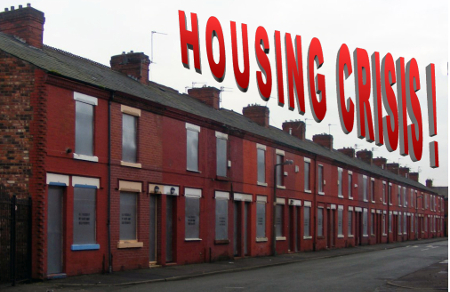A locked-out generation: young people in the housing crisis
Article published: Sunday, November 1st 2015
The housing crisis means that more and more young people are struggling to buy their own homes. The Prime Minister’s expansion of the Right to Buy scheme intends to turn the increasing number of young tenants from Generation Rent into “Generation Buy”, as indicated in his speech to the Tory party conference. Will it work?

Photo: Ian Roberts
Earlier this month David Cameron made an agreement with housing associations and the National Housing Federation that will extend the Right to Buy to allow over a million tenants in housing association properties. The tenants will be able to purchase their homes at a discount of between £9000 and £16,000, if they have lived there for over three years. The scheme has received criticism for ignoring the many people renting who cannot afford to buy and young people living with parents who cannot afford to rent or buy.
Right to Buy will not only decrease the social housing stock as council houses are being sold off to fund the policy. A report by Shelter calculates that around 113,000 council houses could be sold off to fund the scheme
Alongside this, Cameron plans for 200,000 starter homes to be sold at discount to market rates to first-time buyers under 40. To enable private housebuilders to offer this type of housing the Conservatives are scrapping their obligations to build/fund social housing. For Cameron, this policy is in line with the constantly emphasised Tory tag line: security.
Yet as the housing crisis worsens, it seems that there are many who doubt that Cameron’s plans will create “Generation Buy” and make affordable homes a reality for first-time buyers. Cameron’s changes to the definition of ‘affordable housing’ include properties worth up to £450,000 in London and £250,000 outside of London, have proved controversial.
The Mirror calculated that a single person would need to earn a salary of £55,000 to qualify for a mortgage of £250,000 to be able to buy an ‘affordable home’: more than double the national average salary. A couple without children would each need to earn £33,000 a year while a couple with children would struggle even more. If one parent worked part time, as many do, the other would have to earn around £61,000.
With George Osborne’s National Living Wage, the amount of hours people would be required to work to earn this kind of money would be virtually impossible in practice. And the living wage is only for over 25’s, making the prospects of owning a home for younger people – particularly young families – seem bleak. Because of this, many are renting properties which are unsecure, poorly maintained and expensive, or living with their parents.
A 22 year old mother from Stockport who now lives in Tameside with her partner and son spoke of having to bend the rules, in order to buy a house. “My partner owns our house, but when applying for the mortgage he did not declare that his pregnant girlfriend would be living there too because we would both be dependent on his income.
“Buying the house was very difficult.
“We had a budget of £100,000 with a £15,000 deposit. A £250,000 home would be affordable for a family with two decent incomes but that is not most people.”
According to a survey by the Institute for Public Policy Research, three quarters of people under 25 aspire to own their own home, but almost half of young people they surveyed renting believe it will be at least ten years before they are able to own a home.
The same survey showed that almost 20% of young renters claimed that they did not feel safe or secure in rented properties. Cameron’s policy promises to provide this security, but many young people feel that it will not help them to buy rather than rent, and may even make it more difficult to rent as more council-owned properties are sold off.
Alex, 21, who works in law in central Manchester, hopes to buy a property in the city centre. He claimed that “you need to be financially stable to buy and live in a house and nowadays it’s pretty tough to be in that situation when you’re young.”
Buying a house is important for young people who want a place to call their own. When asked about why he wanted to own a property, Alex said “it’s about having that independence for me. And a place to call my own where I can do whatever I want and it be mine. It’s sort of like another chapter to life when you move out.”
Southway Housing Trust in South Manchester is one of the many housing associations involved in the recent government deal extending the Right to Buy. Though the deal was presented as voluntary, many housing associations claimed they were effectively forced into agreeing by the options given to them: agree now, or the government will legislate for a more severe deal later.
Richard, communications officer for Southway Housing Trust, claimed that he imagined there was a “certain amount of coercion involved.”
“Selling off our houses isn’t our favourite option and the alternatives didn’t look favourable.”
On the starter home policy, Richard claimed that “there’s a need for more homes out there in general. It’s good to aspire to own a home but not everyone can do it. It is good that we can help younger people into homes but a lot of young people won’t be in any position to take advantage of even this new policy.”
“There is a definite need to encourage social housing and meet the real demand that’s out there,” he concluded.
Ellie Doward
More: Cuts, Features, Manchester, QuickKick
Comments
No comments found
The comments are closed.



